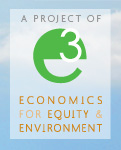By Gernot Wagner, Environmental Defense Fund
Economists typically aren’t known for being nuanced. They are known, though, for responding to incentives. So perhaps this should change things: in 2009, Elinor Ostrom shared a Nobel Prize in economics for looking at exactly the question of what happens in between the two extremes: the tuna’s global free for all and the straw man of all-private, all-the-time. The Nobel citation commended her “for her analysis of economic governance, especially the commons.”
Her analysis applies to anything from Maine lobstermen to Swiss Alpine pastures to small forests in India, irrigation rights in Spain and the Philippines and umpteen other cases. Ostrom set out to find patterns across these disparate cases. At first, she was looking to deduce a blueprint, a single rule. That was harder than it looks.
Bear with me. Ostrom won a Nobel for her nuance for a reason.
She identified six common themes of what works and what doesn’t. First and foremost, avoiding the tragedy of the commons takes well-defined territories. Maine’s lobster gangs definitely share that feature. Anyone who violates the boundaries of their own lobstering ground might find their lobster traps cut or their outhouses burning. Even Hardin’s pastures should have clear boundaries: fences, usually, or other natural limits. Second, she found a rough link between the costs and benefits of the rules of the game. If lobstermen felt that sticking to their gangs’ edicts didn’t provide them with appropriate personal benefits, gangs would quickly fall apart. Self-interest still rules the day. Similarly, and point number three, everyone wants a say in setting up the rules. Not everyone’s advice will be heeded, but everyone at the very least will be heard. That’s not just an act in futile pseudo-democracy; it’s key for keeping everyone on board and committed. Fourth on Ostrom’s list is monitoring. Someone ought to keep track of what’s going on. That could either be the unelected gang kings or the duly elected head of the local Lobstermen’s Association. In either case, he or she needs to draw their authority by cultivating the respect of everyone involved, and also provide a forum for grievances, another one of Ostrom’s points. Which leaves us with her sixth: There must be sanctions for violations of any kind. These can’t be too exorbitant at first but ought to be increasingly stiff for repeat offenders. Three strikes and you are banished from the harbor.
Preventing the tragedy of the commons turns out to be a messy business. Systems that combine private efforts, public governance and communities of various shapes and sizes tend to manage resources best. And it’s often the community function that has the biggest influence.
Maine lobstermen don’t just compete with each other once to catch as many lobsters as possible for themselves. They face each other season after season and also in other walks of life, whether at the market, at their kids’ school, or in church.
The key word in all of this is “manage.” Garrett Hardin, Mr. Global Commons Problem, by now has acknowledged as much. Thirty years after his article that caused the original stir, he wrote a follow-up for Science in 1998, in which he declared his “weightiest mistake” to be “the omission of the modifying adjective ‘unmanaged.’” The tragedy of the unmanaged commons makes ruin inevitable. Although here again, he manages to present the solution as an either-or: the choice is between “socialism or the privatism of free enterprise.” If you like to describe Maine harbor gangs as “socialist,” fine. I have a feeling that they would strongly disagree and may even back up their verbal disagreement with decidedly non-social behavior.
The true system of checks and balances that keeps the system afloat is much more nuanced than that. It is “polycentric,” to use Ostrom’s Nobel-winning term.
The crucial question now becomes which kinds of commons can be managed—whether mafia-style as with Maine’s harbor gangs or in slightly less dramatic settings like Alpine pastures or ancient irrigation systems that have been managed successfully for many centuries? The example of the factory upstream and the pollution victim downstream is on one end of the spectrum. That’s Ronald Coase and Garrett Hardin’s territory. Maine lobster grounds are somewhere in the middle. That’s where Ostrom shines.
And shine she did. Only today, her latest analysis appeared about why cities can and must show the way on climate, Rio+20′s ambitious (and necessary) global goals notwithstanding.
R.I.P.
 (more…)
(more…)
